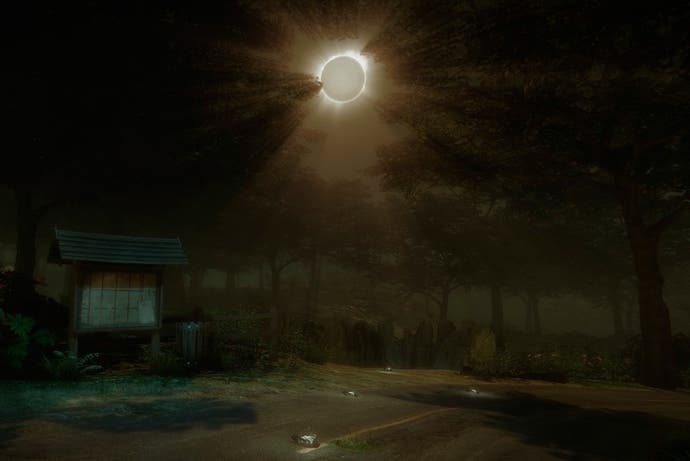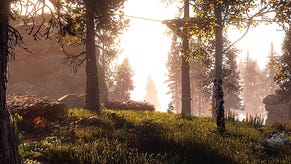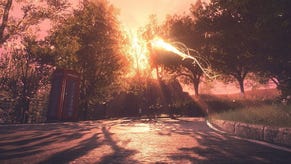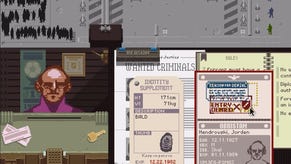The Chinese Room on its PS4-exclusive Everybody's Gone to the Rapture
It's the end of the world as we know it.
Last week we did a postmortem on The Chinese Room's experimental horror sequel Amnesia: A Machine for Pigs, and as fascinating as it was to hear all the decisions that went into developing that, I couldn't help wonder about the Brighton-based studio's upcoming PS4-exclusive first-person exploration game, Everybody's Gone to the Rapture.
The evocative title aims to explore rural Shropshire an hour before the end of the world. When studio head Dan Pinchbeck discussed Rapture last summer, it was said to feature a Majora's Mask-esque time mechanic that would constrain each playthrough to about an hour. When asked about this now, Pinchbeck laughs, "Yeah, that's gone."
"Originally, when we started the game off it was going to be an hour long for each playthrough. It would be almost like kind of a Groundhog Day or 12:01-type thing where you've got an hour. How far can you get? How much can you explore? Imagine reading a novel and you're really into it, and 30 pages before the end someone comes up and takes it out of your hand and goes, 'I'm afraid that's it. Your time's up.' It's an artificial conceit that doesn't necessarily produce a good player experience." Time limits, Pinchbeck notes, are "probably more suited to an arcade-style game, but not really good for a non-linear story-driven drama."
Pinchbeck notes that Rapture will still be non-linear and set during the final moments before the apocalypse. "Time still plays a fairly central role in the game - it's just the time-locked stuff is gone," he clarifies, though he hasn't sorted exactly how this will be handled. "One of the things we really, really wanted to explore with Rapture was the uniqueness of storytelling in games. So there are things you can do in terms of how the narrative is structured and how the player relates to the structure of that narrative and how time relates to all of that, that you can't do in another medium. That's something that's pure games. We really wanted to explore: what is it we can do with this that no other medium would be able to touch? How do we make this a real 'game drama' rather than a drama that just happens to be a on a game machine?"
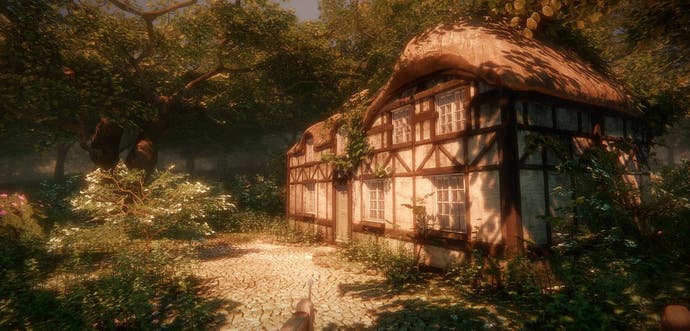
"How do we make this a real 'game drama' rather than a drama that just happens to be a on a game machine?"
Unlike The Chinese Room's earlier effort, Dear Esther, Rapture will have more player agency and even characters to interact with. "We're really interested in the idea of the player having something that is a deep, strong drama, but having something where the player can still feel a deep sense of ownership over their story and over their journey through this space and it really feels like what they're doing has a significant meaning in the world."
When asked if players will be able to do everything in one playthrough, Pinchbeck says that he hasn't figured that out yet. "Whether we want the player to be able to likely hit 100 per cent of everything there is or if we want to do like 60-70 per cent, is still a little bit in flux as we're putting stuff in.
"What I would say is that I'm not really hung up on the notion of replay value in games, because I generally have no problem with going back and playing the same thing over and over again if I love it, the way I'd revisit the same book or the same film because you see new things on multiple playthroughs. I don't think things need to be different. That's just my personal tastes.
"In terms of the kinds of scale of development we work at and the types of game we make, I think that replay value is a very, very hard thing to achieve in a satisfying way, so we don't really worry about that."
Pinchbeck notes that as much as he enjoys games that are rich enough to warrant multiple playthroughs, he isn't necessarily keen on being forced to replay a game to gather all of its content. "I like the idea that a player can go back to a game and discover new things, but that's not always the case if they're stopped from experiencing everything the game has to offer. It should be that the game is rich enough and interesting enough that you can understand it in a different way when you return to it, and certainly that has been our experience with Esther, and Pigs as well. So it's more about kind of going, 'We want to tell a really good story, where we want the player to have a really engaging story-driven experience.' That's the target and the rest of the game will sort of mould and shape right up to the wire to try to make sure that's happening."
"I'm not really hung up on the notion of replay value in games, because I generally have no problem with going back and playing the same thing over and over again if I love it."
On that note, Pinchbeck says that he's recently replayed the original Deus Ex for the seventh time and is still noticing new details to enjoy. Other games that keep drawing him back include the Stalker and Metro series and he says he's clocked about 170 hours in Just Cause 2. "It's sort of like the opposite extreme to the types of games we make," he says of Avalanche's open-world third-person para-shooter. "It's a really great example of a game in terms of that player/game contract. It just lays out in front of you and goes, 'This is just a big, stupid game where you can blow s*** up in hilarious ways. Don't expect anything else.' And then then it just delivers blowing s*** up in funny and interesting ways and doesn't ever overstep its mark in terms of what it's trying to do."
While Pinchbeck is still tinkering with exactly how he wants to handle Rapture's structure, he notes that by and large he's not typically a fan of branching narratives. "I don't think it's massively satisfying," he says. "I think in a way they got away with it in Mass Effect based on the quality of the writing, but I think it's inherently a difficult thing to manage as it just ends up splurging out the sides. What I'm much more interested in as a writer is going, 'There's kind of an inherent branching narrative in a player because they're interpreting all the time anyway, and if you're not trying to nail their interpretation into narrow boxes all the time, a lot of that stuff will happen anyway.'
"The players will take a bunch of images and they'll create a story from those images that may deviate from what you had in your head to various degrees, and that's okay. I think the key challenge as a writer is to go, 'How do we kind of lead them to places because it's rewarding for them to end up rather than force them down a tunnel?' Branching narratives tend to force down tunnels because they get so big and so complicated that you have to be quite tightly controlled with them and I'm more interested in saying, well, okay, we don't actually have to offer any actual branching narratives, but it can feel like the biggest branch in the world if we're not too prescriptive about how the player should interpret what they're coming across."
"We don't actually have to offer any actual branching narratives, but it can feel like the biggest branch in the world if we're not too prescriptive about how the player should interpret what they're coming across."
When asked if he means something like The Walking Dead that offers lots of choices, but funnels them all into a mostly authored conclusion - so players get the sense of great differentiation without actually splitting the narrative into vastly different branches - Pinchbeck says, "I think the reason The Walking Dead was so effective is because they [Telltale] knew where not to branch."
The Chinese Room lead believes that the onus shouldn't be on the player to find the most satisfying outcome. "When you sit in front of a film or you open a book, you want it to deliver you an experience and you want to not have to take responsibility for that experience being good," Pinchbeck explains. "If I'm playing a level in Half-Life 2, I don't feel like it's my responsibility to make sure this is fun... With that kind of story I feel there is a danger with morality bars that if you don't get the outcome you wanted that's kind of your responsibility because you made bad calls. I don't feel inherently comfortable towards that as an idea."

"If we're not enjoying the games we make, then there's pretty much no point in making them."
Pinchbeck still doesn't know what The Chinese Room will work on once Rapture is complete, but says he's been kicking around some game ideas with the team. While he can't discuss them yet, when asked if he'd ever consider making a more traditional game, he replies, "I'd definitely love to make a fairly traditional game."
"I think in terms of being a studio known for very, very experimental stuff, you're also kind of aware that while you're trying to build a sense of 'this is what we do' and 'this is what we're good at,' you also don't want to be known as a company who basically can't make games just because we've gotten into a situation where we haven't made anything particularly traditional yet."
He then adds: "There are IPs that if they fell in my lap I would be very, very, very happy to take on."
Oh? Like what?
"If I had Stalker, if I had Metro - either of those I'd be really, really happy with. I think we'd do a really, really good job on Doom 4 if we were given a shotgun and a load of duct tape." He then laughs, "It'd probably be a terrible idea for us to make Stalker or Metro or Doom, because we're such big fans of it we couldn't possibly have a critical distance."
Oh, and one more comes to mind for Pinchbeck: "If we got System Shock 3 then we'd pretty much drop everything and make that." A guy can dream, right?
"I think we're all going, 'Yeah, it'd be fun [to make a traditional game].' And it being fun is really kind of fundamental to what we're doing. If we're not enjoying the games we make, then there's pretty much no point in making them."
